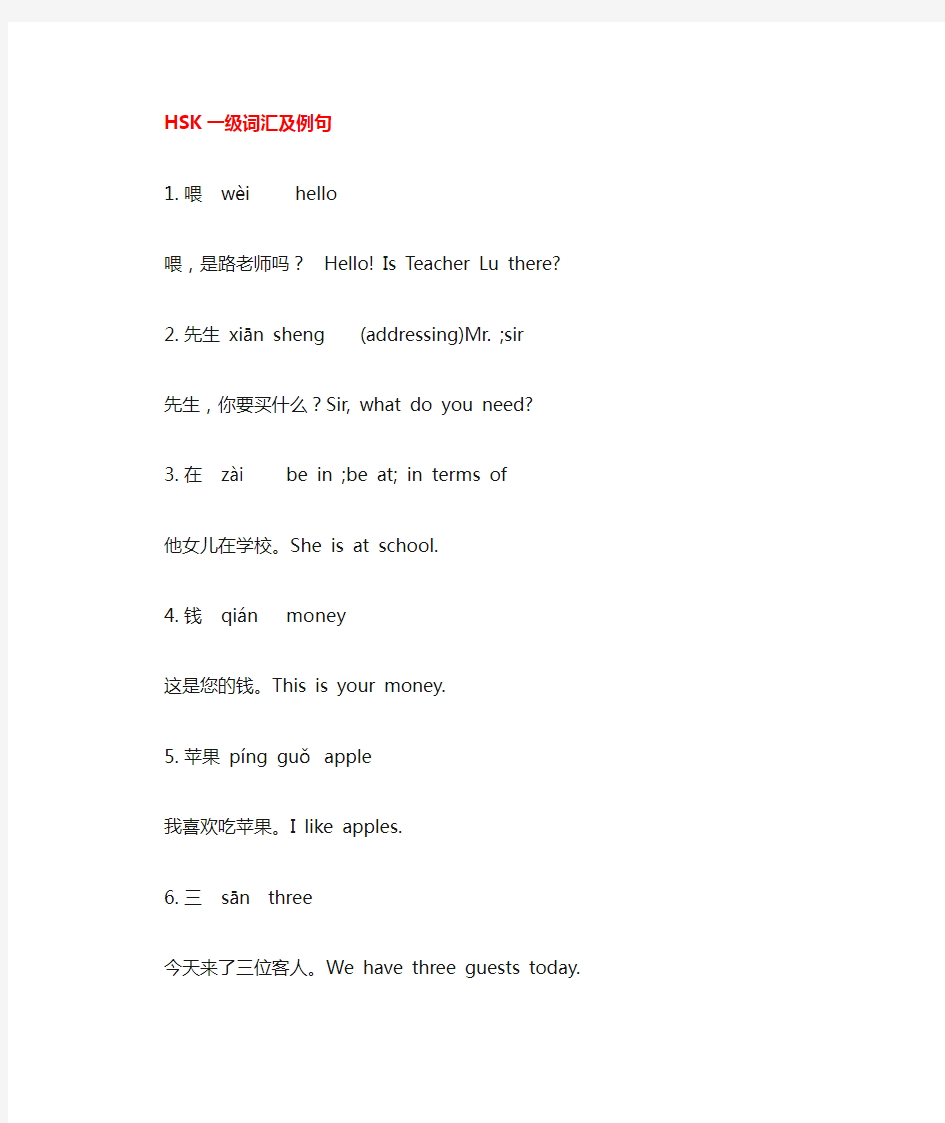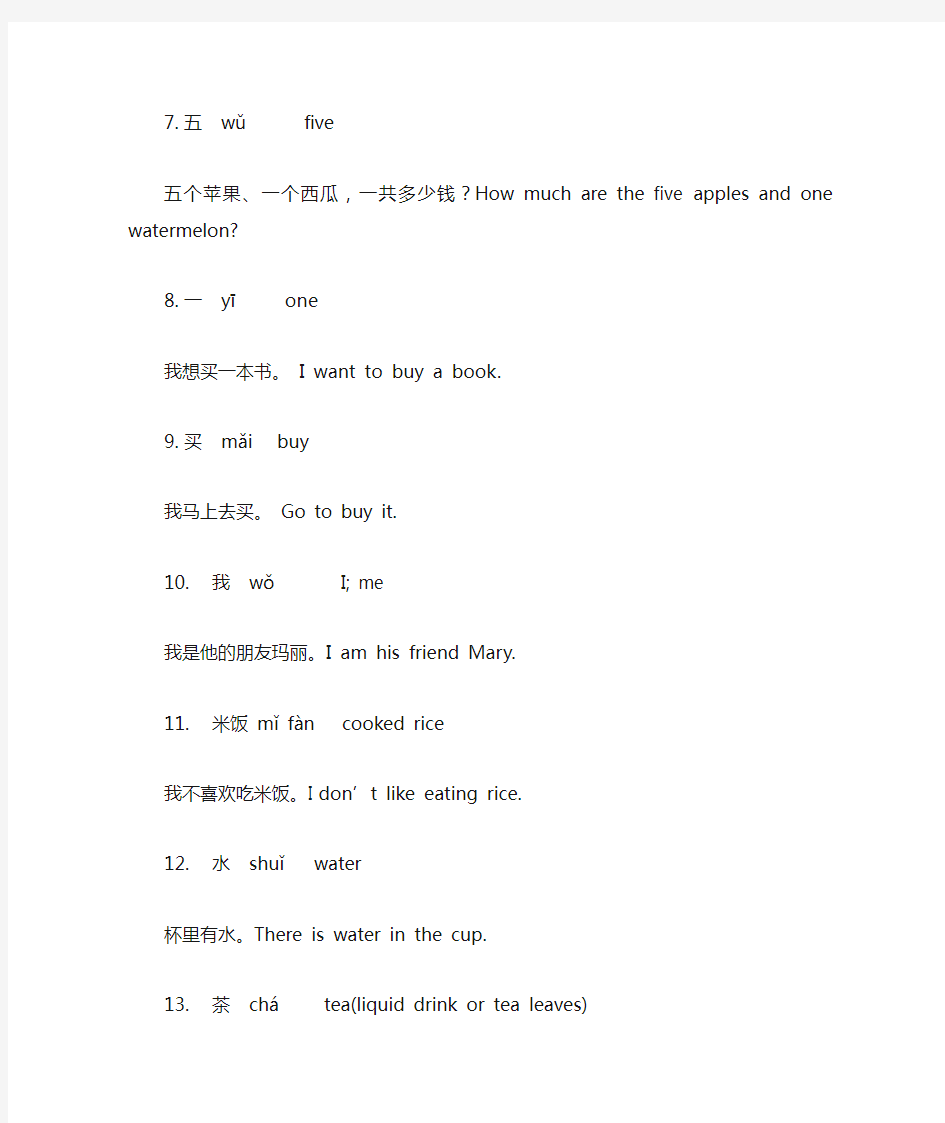HSK 一级词汇及例句


HSK一级词汇及例句
1. 喂wèi hello
喂,是路老师吗?Hello! Is Teacher Lu there?
2. 先生xiān sheng(addressing)Mr. ;sir
先生,你要买什么?Sir, what do you need?
3. 在zài be in ;be at; in terms of
他女儿在学校。She is at school.
4. 钱qián money
这是您的钱。This is your money.
5. 苹果píng guǒapple
我喜欢吃苹果。I like apples.
6. 三sān three
今天来了三位客人。We have three guests today.
7. 五wǔfive
五个苹果、一个西瓜,一共多少钱?How much are the five apples and one watermelon?
8. 一yīone
我想买一本书。I want to buy a book.
9. 买mǎi buy
我马上去买。Go to buy it.
10. 我wǒI; me
我是他的朋友玛丽。I am his friend Mary.
11. 米饭mǐ fàn cooked rice
我不喜欢吃米饭。I don’t like eating rice.
12. 水shuǐwater
杯里有水。There is water in the cup.
13. 茶chátea(liquid drink or tea leaves)
我喜欢喝茶。I like drinking tea.
14. 什么shén me what
飞机什么时候起飞?What time does this flight take off?
15. 你nǐyou
你真忙。You are so busy.
16. 二èr two
一心不可二用。One can not be in two places at once.
17. 四sìfour
我每个星期去四次健身房。I go to the gym four times a week.
18. 六liùsix
六点了,我要下班了。It is six o'clock. I am going home from work now.
19. 七qīseven
他把“七”听成了“一”。He misheard seven as one.
20. 八bāeight
我每天工作八个小时。I work eight hours a day.
21. 九jiǔnine
这么早。现在才九点。So early. It is only nine o’clock now.
22. 十shíten
我过十分钟给你打电话。I’ll call you up in ten minutes.
23. 出租车chū zū chētaxi
出租车坏了。The taxi is broken.
24. 飞机fēi jīairplane
飞机要准备起飞了。The plane is ready to take off.
25. 昨天zuó tiān yesterday
昨天下雨了。It rained yesterday.
26. 今天jīn tiān today
今天星期六。Today is Saturday.
27. 明天míng tiān tomorrow
明天你要做什么?What are you doing tomorrow?
28. 现在xiàn zài now; nowadays; today; at present
现在十点了。It’s ten o’clock now.
29. 上午shàng wǔmorning
今天上午我去银行。I will go to the bank this morning.
30. 中午zhōng wǔnoon; midday; noonday
中午我们没吃饭。We didn’t have lunch at noon.
31. 下午xià wǔafternoon
下午我去学校。I will go to school in the afternoon.
32. 学校xué xiào school
他女儿在学校。She is at school.
33. 医院yī yuàn hospital
医院在哪儿?Where’s the hospital?
34. 商店shāng diàn shop
前面有一个商店。There’s a store ahead.
35. 年nián year
我们认识十七年了。We’ve known each other for seventeen years.
36. 月yuèmonth
你这个月的房租还没交。You haven't paid the rent this month.
37. 个gèbefore nouns, after numbers as the measure word but has no special
measure word of its own.
我们一共四个人。we have four people totally.
38. 星期xīng qīweek
每个星期工作五天。I work five days every week.
39. 分钟fēn zhōng minute
我等他5分钟。I waited for him for five minutes.
40. 前面qián miàn in front; ahead; at the head; before
医院在我家前面。It’s in front of my house.
41. 后面hòu mian at the back; in the rear, behind
妈妈在我后面。Mom is at the back of me.
42. 医生yī shēng doctor
我找张医生。I am looking for Dr. Zhang.
43. 对不起duì bu qǐ I'm sorry.; sorry; I beg your pardon.; Excuse me
对不起,我不能去。Sorry, I can’t go.
44. 没关系méi guān xi It doesn't matter.; It's nothing.; That's all right.; Never mind.
没关系,再说一次。Never mind. Once again, please.
45. 会huìmeeting
他什么时候开完会?When will he leave the meeting?
46. 打电话dǎ diàn huàphone; ring up; call (up); give sb. a call [ring]; give someone a
ring
我给爸爸打电话。I’ll call my dad up.
47. 叫jiào name; called(followed by a name)
你叫什么?What’s your name?
48. 爱ài love; like; be fond of
我爱吃西瓜。I like eating watermelons.
49. 冷lěng cold
冬天很冷啊!How cold it is in winter!
50. 热rèhot; warmhearted; high in temperature
天气真热!How hot the weather is.
51. 写xiěwrite
你的字写得真好。You write a really good hand.
52. 同学tóng xuéfellow student, schoolmate
我和同学去商店。I go to the shop with my classmates.
53. 朋友péng you friend
我是他的朋友玛丽。I am his friend Mary.
54. 吃chīeat
您想吃什么?What would you like?
55. 喝hēdrink
我喜欢喝花茶。I like to drink flower tea.
56. 看kàn see; look at
看,天晴了!Look, it's sunny!
57. 听tīng hear; listen
我要听一会儿音乐。I want to listen to music for a while.
58. 猫māo cat
猫在吃东西。The cat is eating.
59. 狗gǒu dog
这是你的狗吗?Is this your dog?
60. 桌子zhuō zi table; desk
苹果在桌子上。Apples are on the table.
61. 椅子yǐ zi chair
椅子在哪儿?Where is the chair?
62. 杯子bēi zi cup; glass
这是杯子。It’s a cup.
63. 电视diàn shìtelevision; TV
沙发在电视对面。The sofa is opposite the TV set.
64. 的de of, used after an attribute as a marker of attributive
今天的鱼很新鲜。The fish is fresh today.
65. 都dōu all; both
他们都举起了手。They all put their hands up.
66. 好hǎo good; ok(please); fine ;be ready; be done
你的服务很好。Your service is very good.
67. 老师lǎo shīteacher
他也是老师吗?Is he also a teacher?
68. 学生xué sheng student
我是新学生。I am a new student.
69. 和héand
今天吃豆腐和西兰花。T ofu and broccoli.
70. 几jǐseveral; some, express an indeterminate amount
输入几个字就可以。You only need to type some words.
71. 书shūbook
这是我的书。This is my book.
72. 吗ma used at the end of a sentence, indicating a question
今天冷吗?Is it cold today?
73. 没méi not
电影还没开始。The movie hasn’t started.
74. 呢ne used at the end of a sentence to indicate change in status
为什么不喜欢呢?Why not?
75. 少shǎo less; little; few; not many/much
她在减肥,怪不得吃得那么少。No wonder she eats so little. She's on a diet.
76. 我们wǒ men we, us
我们常去公园散步。We often take a walk in the park.
77. 他tāhe; him
他是我的朋友。He is my friend.
78. 她tāshe; her
她是我的老师。She is my teacher.
79. 谁shuíwho; whom
你和谁去?Who are you going with?
80. 哪儿nǎ er where
在哪儿取行李?Where is the baggage claim?
81. 怎么zěn me how, inquiring for property, condition, way, and cause, etc.
他们怎么认识的?How did they know each other?
82. 怎么样zěn me yàng How about it? What do you think?(inquiring for comments
and suggestions as an independent sentence)
今天天气怎么样?How is the weather today?
83. 那nàthat
这是我的,那才是你的。This is mine and that is yours.
84. 这zhèthis
这是什么?What’s this?
85. 爸爸bà ba papa; dad; father; daddy
爸爸在看报纸。My father is reading a newspaper.
86. 妈妈mā ma mom; mum; mommy; mama
我跟妈妈去跑步。I went running with mother.
87. 女儿nǚ ér daughter
这是你女儿吗?Is she your daughter?
88. 儿子ér zi son
你儿子多大了?How old is your son?
89. 小姐xiǎo jie Miss
李小姐很热情。Miss. Lee is very warm.
90. 人rén person; people
你家有几口人?How many people are there in your family?
91. 多duō a lot of
我有很多事。I have a lot of things to do.
92. 工作gōng zuòwork;job
你喜欢这个工作吗?Do you like this job?
93. 衣服yī fu clothes
我想买衣服。I want to buy clothes.
94. 电脑diàn nǎo computer
他买电脑了吗?Has he bought a computer?
95. 回huíreturn; go back
你该回房间了。It’s time for you to go back to your room.
96. 回huíto express how many times
这一回,她把萝卜紧紧地抓在手里。This time, she grabbed the turnip in her hand tightly.
97. 做zuòmake; do
你去学校做什么? What are you going to do at school?
98. 读dúread
这些故事读起来,实在是太有意思了。These stories are so interesting to read.
99. 叫jiào ask;order
我叫他一起吃饭。I invited him to have dinner together.
100. 想xiǎng think; ponder; think over
你快想个办法来解决一下这事。Think of something fast to solute this problem. 101. 太tài too; very much; extremely(in expressing approval or compliment) 东西太多了。There are too many things.
102. 漂亮piào liang pretty; beautiful
这件衣服真漂亮。This dress is beautiful.
103. 学习xué xístudy; learn
我学习汉语。I learn Chinese.
104. 家jiāhome; family; household
欢迎你来我家。Welcome to my home.
105. 请qǐng please
请您数一数。Please count it.
106. 认识rèn shi to know; acquaint oneself with
很高兴认识你。Nice to meet you.
107. 汉语hàn yǔChinese
他在学汉语。He is learning Chinese.
108. 电影diàn yǐng film; movie; cinema; motion picture
咱们去看电影吧。Let's go to the cinema.
109. 家jiāmeasure word, for families, shops and business establishments 是一家大公司吗?Is it a big company?
110. 高兴gāo xìng happy; joyful; glad
今天大家真高兴。Everyone is happy today.
111. 说话shuō huàspeak; talk; say
你跟它们说话吗?Do you talk to them?
112. 很hěn very; quite
学汉语很难。Leaning Chinese is very difficult.
113. 是shìbe(am/is/are)
这是什么?What’s that?
114. 岁suìyear(of age)
它几岁了?How old is it?
115. 了le use at the end of a sentence or a pause in the middle of a sentence to indicate a completion or a new situation
上班要迟到了!I'll be late for work.
116. 谢谢xiè xie thanks; thank you
我明白了。谢谢你。I see. Thank you.
117. 北京běi jīng Beijing
我明天去北京。I’m going to Beijing tomorrow.
118. 中国zhōng guóChina
你什么时候去中国?When are you going to China?
119. 喜欢xǐ huan like; be interested in(sb. or sth.)
我喜欢踢足球。I like playing football.
120. 饭馆fàn guǎn restaurant; eatery; (large) hotel
前面有一家饭馆。There is a restaurant ahead.
121. 有yǒu have; possess; there be
我有一个哥哥。I have a brother.
122. 坐zuòtravel by(a vehicle); take
坐飞机几个小时?How many hours by plane?
123. 天气tiān qìweather
今天天气怎么样?How is the weather today?
124. 睡觉shuì jiào sleep
我要睡觉了。I am going to sleep.
125. 本běn meassure word for counting books and other bound items 这本书多少钱?How much is the book?
126. 住zhùlive; stay; dwell
你住在哪儿?Where do you live?
127. 能néng can; be able to
对不起,我不能去。Sorry, I can’t go.
128. 里lǐinner; inside
杯子里有茶。There’s tea in it.
129. 去qùgo
我去学校。I’m going to school.
130. 不bùno; not
我今天心情不好。I feel blue today.
131. 时候shí hou time; moment
你什么时候开始学汉语的?When did you start to learn Chinese?
132. 再见zài jiàn good-bye; see you again
我是来跟你说再见的。I come to say goodbye to you.
133. 水果shuǐ guǒfruit
我们在吃水果。We are eating fruits.
134. 来lái come
你怎么才来啊?Why do you come so late?
135. 那儿nà er there
他每天早上都要去公园,因为那儿的空气很新鲜。He goes to the park every morning because the air there is fresh.
136. 名字míng zi name
你叫什么名字?What’s your name?
137. 菜cài food;dish
这菜真好吃啊!This dish is so delicious!
138. 大dàbig; large
他的狗很大。His dog is very big.
139. 小xiǎo small
他个子很小,不过跑得很快。He is small but runs fast.
140. 这儿zhè er here
这儿就是公司。Here is the company.
141. 些xiēsome; a few; a little
有些网络语言很有趣。Some internet phrases are very interesting.
142. 哪nǎwhich; what(used in front of a measure word) 哪件好看?Which one is beautiful?
143. 火车站huǒ chē zhàn train station
他在火车站。He is at the train station.
144. 上shàng on; upper; upward
两只鸟站在树枝上。Two birds are standing on the branch.
145. 不客气bú kè qi You’re welcome.
——谢谢你的苹果。——不客气。——Thank you for your apples. ——You are welcome.
146. 想xiǎng want to; be going to; would like to
我不想起床。I don’t want to get up.
147. 菜cài vegetable
今天的鱼比菜新鲜。The fish is fresher than the vegetable today.
148. 点diǎn measures word for many objects such as small things, items, time unit (o'clock)
现在两点半。Now half past two.
149. 多少duō shǎo how much; how many
鸡蛋一斤多少钱?How much is one catty of eggs?
150. 块kuài the basic unit of money in China
这些水果二十块。These fruits are twenty yuan.
151. 会huìcan; be able to
你会写汉字吗?Can you write Chinese characters?
152. 的de “De”used at the end of a sentence to indicate certainty.
是的。Yes.
153. 看见kàn jiàn catch sight of; see
我看见他从外边走进来了。I saw him coming in from outside.
154. 开kāi open; turn on; switch on
房间里的灯开了。The lights in the room are on.
155. 东西dōng xi thing; object
我要去超市买东西。I want to go to the supermarket to buy things.
156. 下雨xià yǔrain
明天会下雨吗?Will it rain tomorrow?
157. 零líng zero
水在零摄氏度结冰。Water freezes at zero degrees centigrade.
158. 日rìday; date
今年的冬至日是十二月二十二日。The Winter Solstice is on 22nd, December this year. 159. 字zìword; character
这个字怎么写?How to write this word?
160. 哪nǎwhere
请问,机场大巴在哪?Where is the airport shuttle bus?
161. 几jǐhow much;how many
它几岁了?How old is it?
162. 的de used at the end of a nominal structure, equivalent to a noun phrase 有什么需要帮忙的,尽管说。If you need some help, just tell me.
163. 下xiàbelow,down,under
桌子底下有一张报纸。There is a newspaper under the table.
164. 是shìyes
是的,这个行业就是这样。Yes, this is the industry.
165. 开kāi hold
今晚杰克开生日派对。Jack has a birthday party tonight.
166. 在zài indicating the action in progress
爸爸,你在干什么?Dad, what are you doing?
167. 和hétogether with;with
床和沙发一样舒服。The bed is as comfortable as the sofa.
168. 开kāi start; operate; drive
开公司要先申请营业执照。You should apply for a business license before starting a company.
169. 小xiǎo young
孩子从小就要接受道德教育。Kids have to get the moral education.
170. 块kuài measures word, used for something shaped like chunks or lumps
有块石头挡着路。There is a stone blocking the road.
171. 后面hòu mian later, afterwards
别急,精彩的节目在后面!Be patient. The best performance is yet to come.
172. 呢ne used at the end of a sentence to indicate a statement 她5岁了,上幼儿园呢。She is five years old. She goes to kindergarten now.
更多内容请点击:https://www.360docs.net/doc/3a4855386.html,/en/app/introduction/HSK-Level-1-Word-Practice
